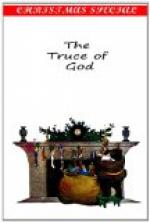In the quiet churchyard on the slope of his beloved Mountain, in a simple grave, over which the green hills of Maryland keep guard, not far from the class-rooms and the chapel he loved, rest the mortal remains of the author of “The Truce of God.” It is not necessary to describe him. Those who read this simple but romantic and stirring tale of the eleventh century which he wrote three-quarters of a century ago, cannot fail to catch the main features of the man. They will conclude that in George Henry Miles, religion and art, the purest ideals of the Catholic faith and the highest standards of culture and letters, are blended in rare proportion.
John C. Reville, S.J.,
Editor-in-chief.
THE TRUCE OF GOD
CHAPTER I
Of ancient deeds so long forgot;
Of feuds whose memory was not;
Of forests now laid waste and bare;
Of towers which harbor now the hare;
Of manners long since changed and gone;
Of chiefs who under their gray stone
So long had slept, that fickle fame
Hath blotted from her rolls their name.
Scott.
Reader! if your mind, harassed with the cares of a utilitarian age, require an hour of recreation; if a legend of a far different and far distant day have aught that can claim your sympathy or awaken your attention; if the “Dark Ages” be to you Ages of Faith, or even lit with the gray morning-light of civilization, come wander back with me beyond the experimental revolution of the sixteenth century, to the time when the Gothic temples of the living God were new.




